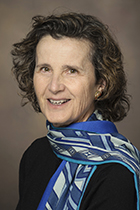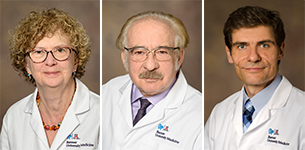 A Weekly Colloquium on Problems in the Biology of Complex Diseases will feature several speakers and topics of interest to University of Arizona Department of Medicine physicians and investigators, including DOM faculty Drs. Xingnan Li, Deb Meyers, Gene Bleecker and Stefano Guerra, who are among speakers in the series, which runs through April 27.
A Weekly Colloquium on Problems in the Biology of Complex Diseases will feature several speakers and topics of interest to University of Arizona Department of Medicine physicians and investigators, including DOM faculty Drs. Xingnan Li, Deb Meyers, Gene Bleecker and Stefano Guerra, who are among speakers in the series, which runs through April 27.
The spring lecture series is hosted by the UA’s Arizona Center for the Biology of Complex Diseases (ABCD), which explores major biomedical challenges regarding diseases such as asthma, cancer, cardiovascular and metabolic disorders, neuro-degenerative and neuro-developmental diseases.
 From left, Drs. Deb Meyers and Gene Bleecker, co-chiefs of the UA Division of Genetics, Genomics and Precision Medicine, and Stefano Guerra, a respiratory scientist in the UA Division of Pulmonary, Allergy, Critical Care and Sleep Medicine, are among colloquium speakers.
From left, Drs. Deb Meyers and Gene Bleecker, co-chiefs of the UA Division of Genetics, Genomics and Precision Medicine, and Stefano Guerra, a respiratory scientist in the UA Division of Pulmonary, Allergy, Critical Care and Sleep Medicine, are among colloquium speakers.
The UA College of Medicine – Tucson lectures are held in conjunction with the departments of Cellular and Molecular Medicine, Molecular and Cellular Biology, Genetics, Immunobiology, and Pharmacology and Toxicology (in the UA College of Pharmacy).
The ABCD is led by Director Donata Vercelli, MD, who’ll offer an “Introduction and Overview” lecture to launch the series on Friday, Jan. 12, 9-11 a.m., in the BIO5 Institute, Room 103. Dr. Vercelli is also a professor of cellular and molecular medicine, associate director of the UA Health Sciences Asthma and Airway Disease Research Center and a BIO5 member. This and other lectures in the series are scheduled for the same date, time and location as follows:
Weekly Colloquium, Spring 2018 – Problems in the Biology of Complex Diseases
(CMM, MCB, GENE, IMB, PCOL 595H)
Fridays, 9-11 a.m., Keating/BIO5 Room 103, Jan. 12-April 27
SPEAKERS SCHEDULE: ![]() Click here [PDF] for a printable schedule.
Click here [PDF] for a printable schedule.
- Jan. 12 | Donata Vercelli, MD (UA) — “Introduction and Overview’
- Jan. 19 | Xingnan Li, PhD (UA) — “Introduction to Complex Disease Genetics”
- Jan. 26 | Debbie Meyers, PhD (UA) — “Life after GWAS”
- Feb. 2 | Eugene Bleecker, MD (UA) — “Pharmacogenetics and pharmacogenomics”
- Feb. 9 | Carole Ober, PhD (U. Chicago) — “17q Asthma Locus: History, Bias and the Search for Truth”
- Feb. 16 | Paul Nelson, PhD (UA) — “Intercellular Competition and the Inevitability of Multicellular Aging”
- Feb. 23 | Casey Romanoski, PhD (UA) — “Mechanisms of Gene Regulation”
- Mar. 2 | Stefano Guerra, MD, PhD, MPH (UA) — “Biomarkers”
- Mar. 9 | Spring Break — NO CLASS
- Mar. 16 | Darren Cusanovich, PhD (U. Washington) — “Single-Cell Approaches to Chomatin Regulation of Gene Expression”; Dr. Vercelli (UA) — “What We Have Learnt So Far” (partial wrap-up)
- Mar. 23 | Jonathan Pritchard, PhD (Stanford) — “Omnigenic Diseases”
- Mar. 30 | Fernando Martinez, MD (UA) — “Thoughts on Complex Disease Phenotypes and Susceptibility”
- Apr. 6 | Raina Maier, PhD (UA) — “The Environmental Microbiome”
- Apr. 13 | Greg Caporaso, PhD (NAU) — “Microbiota in the Built Environment”
- Apr. 20 | Susan Lynch, PhD (UCSF) — “The Human Microbiome in Health and Disease”
- Apr. 27 | Dr. Vercelli (UA) — “Final Wrap-Up”
Human complex diseases such as asthma, cancer, cardiovascular and neurodegenerative diseases, are major biomedical challenges, because they are common but difficult to decipher. The complexity of these diseases is reflected by their phenotypic heterogeneity and likely results from intricate interactions among genetic, environmental and developmental factors that modify disease susceptibility and severity.
Understanding complex diseases is urgent, because these conditions impose a burden on our society. Yet, this goal cannot be achieved by isolated research disciplines. Rather, it requires a novel paradigm that successfully integrates basic and clinical research across multiple fields and translates mechanisms into phenotypes and phenotypes into treatments. This novel paradigm provides the underpinning for this Colloquium.
This colloquium features speakers who are nationally and internationally renowned for their work on environmental biology, immunological and clinical phenotyping, microbiota, developmental biology, epigenetics, genetic epidemiology, population genetics, functional genomics of human and animal models. The series’ theme and vision are unique in that the discussion focuses particularly on the biological components shared by ostensibly distinct complex diseases (for instance, asthma, neurodegenerative and cardiovascular diseases).
The underlying assumption, supported by much emerging evidence, is that these shared components are features that define the mechanistic architecture of complex diseases as a group. The goal of the Colloquium is to provide a platform that will catalyze broad, expert discussions on these foundational topics, thereby fostering the emergence of a new experimental and conceptual paradigm in complex disease biology.
For further information, contact Donata Vercelli, MD, colloquium organizer: donata@email.arizona.edu
ALSO SEE:
“Two New Divisions at UA Health Sciences Target Precision Medicine Remedies via Advanced Genetic, Genomic Research” | Posted Feb. 6, 2017
“Complex Diseases Spring Colloquium Spotlights Local, National, International Speakers” | Posted Feb. 2, 2016

